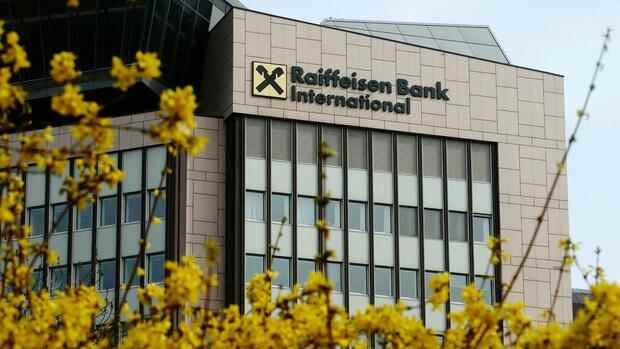Frankfurt The start of the week for Austria’s Raiffeisen Bank International (RBI) could not have been much more dramatic. The institute’s shares on the Vienna Stock Exchange lost 14 percent by early afternoon. The reason for the slump: The RBI is considered the Western European money house with the greatest risk of Russia.
In a radio interview, Gabriel Felbermayr, one of Austria’s most prominent economists, even called for a protective shield for the institute, which generates around half of its profits in Russia, Belarus and Ukraine. “We really have an issue there. Now a protective shield will have to be put in place so that this does not lead to real problems at RBI.”
Other Western European banks with a strong presence in Russia also fell sharply on the stock exchange on Monday. The course of the Italian Unicredit fell by eleven percent, the French bank Société Générale lost ten percent in value.
Although the major German banks have repeatedly emphasized that their exposure to Russia is kept within narrow limits, Deutsche Bank’s share price fell by seven percent, and Commerzbank recorded losses that were just as high.
Top jobs of the day
Find the best jobs now and
be notified by email.
The reason for the price slide on Monday was primarily the tightened financial sanctions imposed by the EU and the USA on Russia over the weekend. The Western allies had decided to exclude selected Russian banks from the Swift global payment system and to freeze the Russian central bank’s foreign assets. A clear escalation to the original sanctions package.
RBI: Damage not yet foreseeable
The extensive international isolation means that the affected Russian financial institutions can no longer settle their liabilities to European creditors, wrote Thomas Gitzel, chief economist at Liechtenstein-based VP Bank.
For the EU banks as a whole, the consequences of the sanctions are manageable, Gitzel judges. The economist puts the liabilities from Russia to the industry at a total of 75 billion dollars or 0.7 percent of all financial institutions’ claims.
Johann Strobl, CEO of RBI, tried to reassure investors: “Our Russian subsidiary bank has a very strong liquidity position and is recording inflows. The capital position is also strong. Our Russian customers trust our bank. At the same time, our colleagues in Ukraine continue to manage to maintain essential banking services.
More on the Ukraine war:
However, the bank also acknowledged that it is not yet in a position to assess the damage from Western sanctions against Russia: “They are harsh and far-reaching in their impact on financial markets and the real economy. The effects on the RBI Group will be analyzed,” says a statement.
According to the analysts at DZ Bank, RBI bears the greatest Russian risk of all European banks. The total commitment of Austrians in the country adds up to 22.85 billion euros. The credit volume amounts to more than eleven billion euros. For RBI, Russia is by far the most important individual market, which most recently made a net profit of EUR 474 million. This corresponds to around 30 percent of the group’s unconsolidated net profit.
Supervisors analyze the risks
The Western European bank with the largest presence in Russia is France’s Société Générale, whose subsidiary Rosbank is among the top ten Russian banks. However, the French are significantly less dependent on profits from Eastern Europe than the RBI. In 2021, the bank in Russia achieved a result of 152 million euros. Overall, the net profit was 5.6 billion euros.
>> Read also: Panic on bonds, ruble in free fall: Russian central bank doubles key interest rate to 20 percent
In view of these figures, the DZ analysts see “no existential threat” from the Ukraine crisis. They put the total commitment of the money house in Russia at 18.5 billion euros.
Unicredit is the third European bank with a strong commitment to Russia – last year the country contributed around 180 million euros to the profit. That corresponded to around eleven percent of the total result.
According to calculations by DZ Bank, German banks are sixth in terms of exposure to Russia, behind France, Italy, Austria, the USA and Japan. Deutsche Bank recently signaled that its involvement in Ukraine and Russia was “manageable and not very large”. The judged similarly Commerzbank the location.
Even before the start of the war, the European Central Bank (ECB) had asked the large institutions in the euro zone to provide precise figures on their activities in Russia and to explain what the impact of larger loan defaults would be for them. According to the ECB, one is in constant and close contact with the supervised institutions.
More: EU subsidiaries of Russia’s Sberbank slide into bankruptcy
